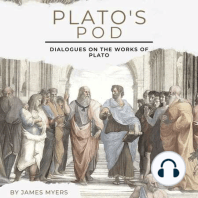114 min listen

Plato's Timaeus Revisited: Part II - A Universe Centered on the Soul
Plato's Timaeus Revisited: Part II - A Universe Centered on the Soul
ratings:
Length:
110 minutes
Released:
Nov 3, 2023
Format:
Podcast episode
Description
Plato’s Pod continues its coverage of Plato’s Timaeus, from 30(d)-47(e) where the astronomer Timaeus explains the construction of the universe centered on the soul. On October 22, 2023, members of the Toronto, Calgary, and Chicago Philosophy Meetup groups discussed the soul’s vantage in the timeless realm of Being relative to motions in the universe’s physical realm of Becoming, and our capacity for reason to differentiate and integrate information received from the physical senses. Timaeus claims that knowledge of proportion is essential to reason, which is one of the questions that the group considered. Participants brought forward many fascinating observations, including a comparison of today’s atomic model to the way Timaeus depicts the universe as spherical. The session ended with Timaeus’ unique description of the nature of time, which we will revisit at the beginning of the next meeting.
Released:
Nov 3, 2023
Format:
Podcast episode
Titles in the series (59)
Dialogue on The Charmides: The “Science of Self” in the Intelligent Universe by Plato's Pod: Dialogues on the works of Plato